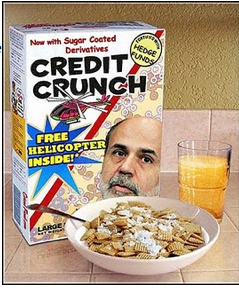What Does The Financial Reform Bill Do Other Than Being Completely And Utterly Worthless?
Courtesy of Michael Synder at The Economic Collapse
 Is it possible to write a 2,300 page piece of legislation that accomplishes next to nothing and is pretty much completely and utterly worthless? The answer is yes. Barack Obama has been trumpeting the Dodd-Frank financial reform bill as the "biggest rewrite of Wall Street rules since the Great Depression", but the truth is that after the Wall Street lobbyists got done carving it up, the bill that was left was so watered down and so toothless that it essentially accomplishes nothing except creating even more government bureaucracy and even more mind-numbing paperwork.
Is it possible to write a 2,300 page piece of legislation that accomplishes next to nothing and is pretty much completely and utterly worthless? The answer is yes. Barack Obama has been trumpeting the Dodd-Frank financial reform bill as the "biggest rewrite of Wall Street rules since the Great Depression", but the truth is that after the Wall Street lobbyists got done carving it up, the bill that was left was so watered down and so toothless that it essentially accomplishes nothing except creating even more government bureaucracy and even more mind-numbing paperwork.
The bill is so riddled with loopholes for the big banks that it is basically the legislative equivalent of Swiss cheese. The Democrats in the Senate were ecstatic when they announced that they had secured the 60 votes needed to pass this legislation, but when they are asked about what the financial reform bill will do, most of them are left stammering for some kind of cohesive response. The sad truth is that most of them probably don’t understand the bill and none of them will probably ever read the entire thing.
So will the financial reform bill do any good at all?
Well, yes.

A very, very small amount.
Essentially, it is kind of like going over to the Pacific Ocean and scooping out a couple of cups of water.
That is about how much good this bill is going to do.
But U.S. Senate Majority Leader Harry Reid is making this sound like this is some kind of history-changing legislation….
"We’re cleaning up Wall Street."
Oh really?
Charles Geisst, professor of finance at Manhattan College recently had the following to say about this absolutely toothless bill….
Like health-care reform, this bill is being drawn up to grab headlines but its details betray it as nothing more than a slap on the wrist for Wall Street. It is true that Wall Street can commit grand theft and apparently get off with nothing more than community service.
The truth is that most of us never expected the U.S. government to truly take on Wall Street. The relationship between the two is just way too cozy for that to happen.
So does the financial reform bill actually accomplish anything?
Yes.
Let’s take a look at the "sweeping changes" contained in the bill….
*Federal regulators will receive more authority to monitor everything from mortgages to complex derivatives. (Oh goody! Just what we needed – more federal regulation! As if federal agencies have ever been very good at regulating the financial industry…)
*Financial firms will be required to reduce the debt they take on and to hold more capital in reserve. (This will make financial firms marginally more stable, but the truth is that the big banks are so good at accounting tricks that this will not really make much of a difference. When a big firm is going to fail a few extra bucks in reserve is NOT going to make a difference.)
*The U.S. government will be given extensive power to seize collapsing financial firms. Federal regulators would keep collapsing firms operating long enough to prevent a massive panic and would slowly sell off its pieces. (This does not eliminate "too big to fail" – instead it enshrines "too big to fail" into law permanently. The bill institutes "orderly procedures" for exactly how to proceed when the U.S. government steps in and takes over failing financial firms. Just what we need – more socialism!)
*The financial reform bill creates a new Bureau of Consumer Financial Protection at the Federal Reserve that is supposed to help prevent abusive lending by mortgage and credit card companies. (Wait a second – this bill gives the Federal Reserve more power? Who came up with that grand idea? Yeah, let’s give the fox more power to guard the hen house. The truth is that the Federal Reserve is one of the core problems with our economic system as we have written about previously.)
*Some rather toothless regulations will be placed on the derivatives markets, hedge funds and credit rating agencies. (A big emphasis on "toothless".)
So what does this legislation not do?
-It does not eliminate "too big to fail". The truth is that the biggest banks and financial institutions have been systematically gobbling up a bigger and bigger share of the market and this legislation does nothing to change that. Anthony Sanders, a professor of finance in the School of Management at George Mason University, says that this bill essentially does nothing about the "too big to fail" problem….
"As far as I can see the ‘too big to fail’ problem is still in place."
In fact, this legislation may cause even more consolidation in the financial industry, because small firms are going to have an especially difficult time complying with all of the new rules, regulations and paperwork created by this bill.
 -The financial reform bill does nothing about the horrific bubble in the derivatives market. Originally it was believed that some tough regulations were going to be imposed on derivatives trading, but the Wall Street lobbyists were all over those provisions like rabid dogs.
-The financial reform bill does nothing about the horrific bubble in the derivatives market. Originally it was believed that some tough regulations were going to be imposed on derivatives trading, but the Wall Street lobbyists were all over those provisions like rabid dogs.
So now there is loophole after loophole in the bill and the "derivatives problem" still ominously hangs over Wall Street. Not that there is any way to fix it.
Nobody actually knows the true total value of all the derivatives in the world, but estimates place it at somewhere between 600 trillion dollars and 1.5 quadrillion dollars.
When the derivatives bubble pops, and it will, there won’t be enough money in the entire world to fix it.
-The financial reform bill does nothing about mortgage giants Fannie Mae and Freddie Mac. They remain financial black holes that the U.S. government will be forced to pour hundreds of billions (if not trillions) of dollars into.
-A proposal to conduct yearly comprehensive audits of the Federal Reserve was left out of the financial reform bill. Instead, a very, very, very limited one-time audit of a few of the transactions that the Federal Reserve conducted during the height of the financial crisis was included.
What we really need is a true audit of the Fed. The Federal Reserve has never been the subject of a true, comprehensive audit since it was created in 1913. Considering the fact that the Federal Reserve issues our currency, controls our banking system, sets our interest rates and is basically the core of the U.S. economy, you would think that the American people should have the right to see what is going on over there.
But Ben Bernanke and the rest of the folks over at the Fed fought against the comprehensive audit proposal with everything that they had. They seemed extremely alarmed that the American people might actually get to take a look inside their books.
The truth is that unless something is done about the Federal Reserve, no true "financial reform" is really going to take place.
But the U.S. Congress could have done at least some good with this bill.
Instead, they have given us a 2,300 page mess that is pretty much completely and utterly worthless.
So what do you think about the "financial reform" bill. Feel free to leave a comment with your opinion….
****
Second and third images courtesy of Jr. Deputy Accountant.


